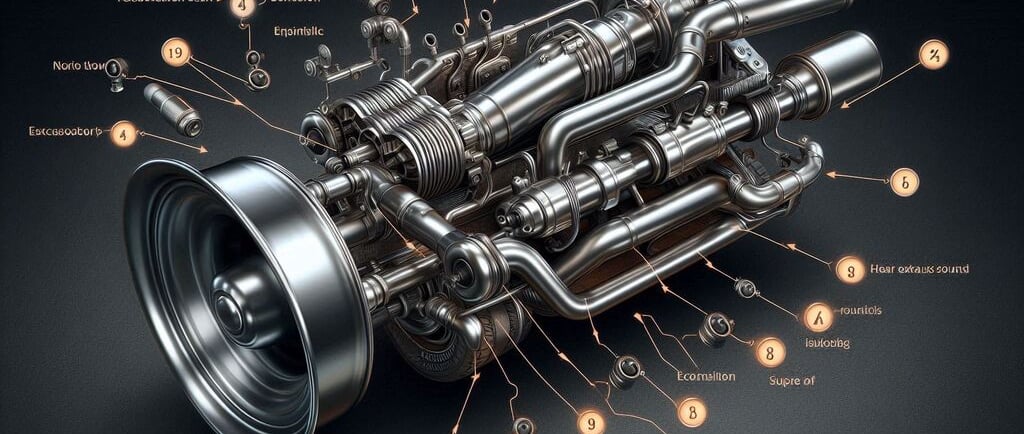Resonator: Modifies exhaust sound and can reduce noise
When you start your car, one of the first things you notice is the sound. While some cars have a roaring engine that gives off an aggressive tone, others prefer a more subtle hum.
EXHAUST SYSTEMS
11/11/20244 min read


Resonator: Modifies Exhaust Sound and Can Reduce Noise
When you start your car, one of the first things you notice is the sound. While some cars have a roaring engine that gives off an aggressive tone, others prefer a more subtle hum. But have you ever wondered what makes these sounds so different? The answer lies in a component of your vehicle’s exhaust system called the resonator. This often overlooked part plays a key role in modifying exhaust sounds and, in some cases, reducing noise.
In this article, we’ll break down everything you need to know about the resonator: how it works, its benefits, and whether or not your car needs one. Let’s dive in!
What is a Resonator?
A resonator is a part of the exhaust system designed to fine-tune or modify the sound of your vehicle. It works alongside the muffler, but unlike the muffler, which primarily reduces noise, the resonator adjusts the tone and frequency of the exhaust sound.
How Does a Resonator Work?
The resonator works by using a series of chambers and perforated tubes inside the component to cancel out certain sound frequencies produced by the engine. When the exhaust gases pass through the resonator, some of the vibrations and sounds are absorbed or redirected, resulting in a different exhaust note.
In simpler terms, while the muffler is focused on reducing overall noise levels, the resonator is responsible for shaping the specific tones of the exhaust sound. This is why some vehicles with resonators may sound more refined or smooth, while others may sound deeper or more aggressive.
The Role of the Resonator in Your Exhaust System
While many drivers assume the muffler handles all the noise reduction, the resonator actually plays a vital role in the overall sound profile of your car. Here's how it contributes to your vehicle’s exhaust system:
1. Noise Reduction
One of the primary functions of the resonator is noise reduction. By filtering out certain frequencies, it can soften the overall exhaust sound. This can be especially useful for vehicles that have a louder engine noise or aggressive exhaust note. For example, performance cars or trucks with larger engines might sound overly loud or grating. The resonator helps refine the sound, making it more pleasant.
2. Tone Modification
Unlike the muffler, which mainly focuses on suppressing sound, the resonator tunes the exhaust sound to a more desirable tone. For example, some resonators are designed to reduce high-pitched whistling sounds or make the exhaust note deeper and more throaty. This can provide a more balanced sound profile, appealing to drivers who want a rich, refined exhaust tone.
3. Improved Driving Experience
A resonator isn’t just about noise—it’s also about comfort. Vehicles without resonators may have harsh or droning noises that can be annoying, especially on long drives. By altering the frequency of the exhaust, the resonator helps make the driving experience more enjoyable and less fatiguing, offering a smoother, quieter cabin.
Should You Add a Resonator to Your Vehicle?
While some cars come equipped with resonators, others may not have them at all. If you're considering upgrading or modifying your vehicle’s exhaust system, here are a few things to think about:
1. Desiring a Quieter Ride
If your vehicle is too loud or the exhaust noise is causing discomfort, adding a resonator could be an excellent solution. For example, cars with straight pipes or aftermarket exhaust systems can often sound excessively loud and disruptive. Installing a resonator can help to balance the noise, creating a quieter ride without sacrificing performance.
2. Enhancing Sound Quality
If you’re a car enthusiast looking to modify the sound of your vehicle, a resonator can be a great tool to achieve the tone you desire. Whether you prefer a more aggressive rumble or a refined, sports car-like growl, the resonator can adjust your car's exhaust note to match your personal preferences.
3. Fuel Efficiency Considerations
Although the resonator is mainly focused on sound, it can also influence the performance of the exhaust system. By improving the flow of exhaust gases, it may even help increase engine efficiency slightly. A smoother flow of gases can reduce backpressure and allow the engine to perform more optimally, potentially improving fuel efficiency. However, this effect is often more subtle compared to the benefits provided by other exhaust components like the muffler or catalytic converter.
Resonator vs. Muffler: What’s the Difference?
While both the resonator and muffler are part of the exhaust system and reduce sound, they have distinct roles. Here’s a quick comparison to help clarify the differences:
Muffler: Primarily designed to reduce overall noise by using sound-dampening materials and chambers. It controls the volume of the exhaust, ensuring that loud engine noises don’t disturb the environment.
Resonator: Works alongside the muffler to fine-tune and modify the exhaust sound. It adjusts the frequency and tone of the noise, making it more refined, smooth, or deep.
Some vehicles come with both a muffler and a resonator, while others may only have a muffler. If you're looking for a balance between noise reduction and tone modification, having both components is ideal.
Signs You Might Need a Resonator
If you're noticing any of the following issues, it may be time to consider installing or upgrading a resonator:
Excessive Exhaust Noise: If your car is too loud for comfort or creates a harsh exhaust note, a resonator can help refine the sound.
Unpleasant Engine Tone: If the exhaust has a high-pitched whine or annoying drone, the resonator can adjust the tone to make it more pleasant.
Performance Modifications: After upgrading to a performance exhaust system, adding a resonator can help control the louder sounds typically produced by aftermarket components.
Conclusion
The resonator is a valuable component in the exhaust system, especially for those who want to modify their car’s sound or reduce excessive noise. Whether you're looking for a quieter ride, a more refined exhaust note, or smoother performance, the resonator can make a significant difference in your driving experience.
Key Takeaways:
The resonator helps modify the tone of the exhaust, creating a more refined or aggressive sound.
It works alongside the muffler to reduce noise and enhance the exhaust flow.
Adding or upgrading a resonator can improve your vehicle’s overall sound profile and provide a more comfortable driving experience.
If you’re considering modifications to your exhaust system, or simply want to learn more about your car’s exhaust components, check out our related articles on [How Mufflers Reduce Noise and Improve Performance] and [The Role of the Catalytic Converter in Emission Control].


